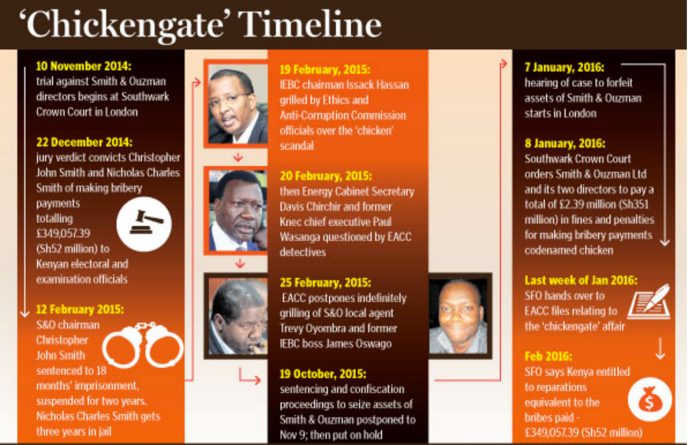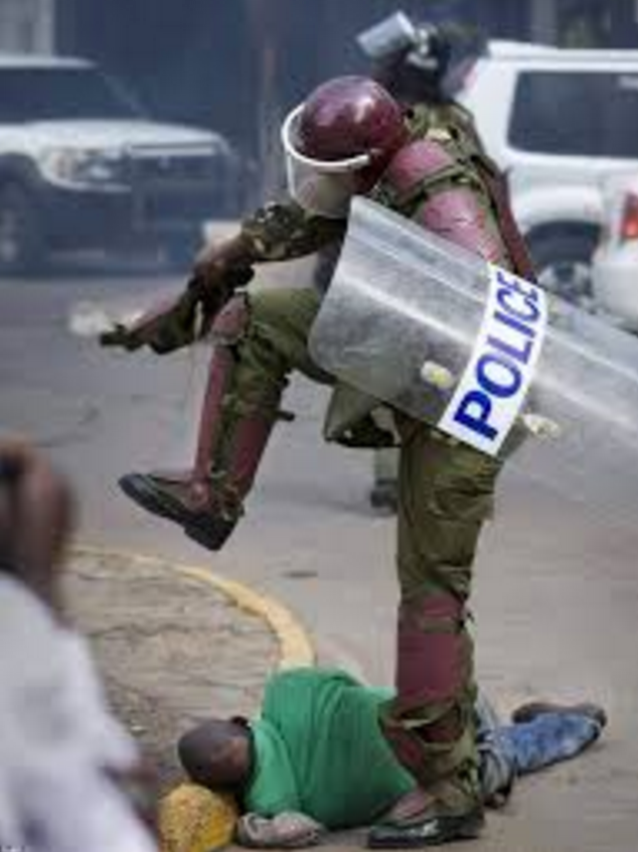Over the last couple of weeks opposition parties in Kenya have staged public protests across the country demanding for personnel changes at the Independent Electoral and Boundaries Commission (IEBC) — Kenya’s electoral management body (EMB). This week’s Monday demonstrations turned violent in some towns and cities, with at least four people reported dead at the hands of anti-riot police.
The organizers of the protests have vowed to keep at it every Monday until the current IEBC commissioners resign. Here are the five things you need to know about the protests:
- A plurality of Kenyans have lost faith in the IEBC (see here).
 In the run up to the 2013 election, several members of the commission (then known as IIEC) and its secretariat were implicated in graft (known as the chickengate scandal) involving a number of British companies. These individuals’ accomplices were found guilty by UK courts; and court documents explicitly mentioned the Kenyans that were bribed by their UK counterparts. Yet a number of those adversely mentioned in the UK court documents continue to remain in office — including the chairman of the commission, Issack Hassan. It is partially for this reason that a plurality of Kenyans (including politicians on both sides of the political divide) have lost faith in the IEBC.
In the run up to the 2013 election, several members of the commission (then known as IIEC) and its secretariat were implicated in graft (known as the chickengate scandal) involving a number of British companies. These individuals’ accomplices were found guilty by UK courts; and court documents explicitly mentioned the Kenyans that were bribed by their UK counterparts. Yet a number of those adversely mentioned in the UK court documents continue to remain in office — including the chairman of the commission, Issack Hassan. It is partially for this reason that a plurality of Kenyans (including politicians on both sides of the political divide) have lost faith in the IEBC. - Opposition politicians, including those in CORD and KANU, want the IEBC reconstituted over suspicions that its current leadership favors incumbent Uhuru Kenyatta and the governing Jubilee Alliance. CORD (in my view, erroneously) maintains that the IEBC was used to rig the 2013 election in favor of President Kenyatta. KANU has most recently accused the same EMB of rigging the Kericho senatorial by-election in favor of the Jubilee candidate. CORD has also argued that its failure to meet the threshold for a popular referendum (dubbed Okoa Kenya) — whose main thrust was a change in Kenya’s electoral laws — was a result of bias within the IEBC. CORD wants the IEBC reconstituted and the new commission to have proportional representation of parliamentary political parties. Although the constitution lays out the procedure for removing commissioners of an independent entity like IEBC (through Parliament), CORD is wary of this option due to its minority status in the legislature. Initially it pinned its hopes on a popular referendum. But when that failed it resorted to mass action in a bid to strategically influence any eventual institutional reform of the IEBC (in my view this eventuality can partially be blamed on the singular failure of the(Jubilee) leadership of the National Assembly).
- The Uhuru Kenyatta Administration is caught between a rock and a hard place. On the one hand, it is hard for the administration to defend an obviously tainted EMB. This would also go against its continued claim that the IEBC is an independent body. But at the same time, the administration needs a reform path that will not embolden the opposition. The thinking within the Jubilee Alliance appears to be that if they give in to CORD on IEBC, what will CORD demand next? The contention that any and all reforms touching on the IEBC should follow constitutionally stipulated channels is partly motivated by this fear. In this regard, if CORD is genuine about surgical reforms specifically targeting the IEBC, it’s leadership should perhaps think of a way to credibly signal to the Kenyatta Administration that their reform agenda is limited in scope. From a purely political standpoint, President Kenyatta has reason to be cautious about the potential to open a whole pandoras box of constitutional reforms.
- Police brutality is (still) common in Kenya.
 One of the goals of Kenya’s new political dispensation following the adoption of a new constitution in 2010 was police reform (majority of the 1,300 killed in the post-election violence of 2007-8 were shot by police). The institution even changed its name from Police Force to Police Service; and an independent police oversight authority was created (to democratize the institution through civilian oversight). But experience since 2013 has shown that these attempts at reform have not yielded any tangible results. The Police Service is still as corrupt as ever. And has little consideration for constitutional limits to its use of force (see image). Which means that more Kenyans will be killed in the hands of the police if the Monday protests continue.
One of the goals of Kenya’s new political dispensation following the adoption of a new constitution in 2010 was police reform (majority of the 1,300 killed in the post-election violence of 2007-8 were shot by police). The institution even changed its name from Police Force to Police Service; and an independent police oversight authority was created (to democratize the institution through civilian oversight). But experience since 2013 has shown that these attempts at reform have not yielded any tangible results. The Police Service is still as corrupt as ever. And has little consideration for constitutional limits to its use of force (see image). Which means that more Kenyans will be killed in the hands of the police if the Monday protests continue. - The 2017 presidential contest will likely be more competitive than most people think. Six months ago I would have predicted a landslide reelection victory for President Uhuru Kenyatta in 2017. Not anymore. President Kenyatta is still the favorite to win (because of incumbency advantage). But the jostling over control of the IEBCand the Supreme Court are telltale signs that the political class is expecting a close contest that will likely be disputed. It says a lot that despite being the incumbent, President Kenyatta’s poll numbers have stubbornly stuck in the low 40s (he can thankmind-blowing corruption and general Public Sector incompetence for that). This means that unless we see a drastic shift in regional alliances, next year’s election will most likely go to a runoff contest between Kenyatta and Odinga — which will be close.The more reason to have credible institutions in the form of a trusted IEBC and a Supreme Court beyond reproach.
What does this say about overall political stability in Kenya? At this point in time I am a lot more worried about county-level electoral violence than a 2007-08 style national disaster. That said, there is reason to fear that continued police brutality, especially targeting opposition supporters, may trigger wider civilian violence against presumed Jubilee supporters.
It is a little too early to talk specifics about next year’s presidential election. But what is clear is that Kenyatta’s reelection battle will no longer be a walk in the park.